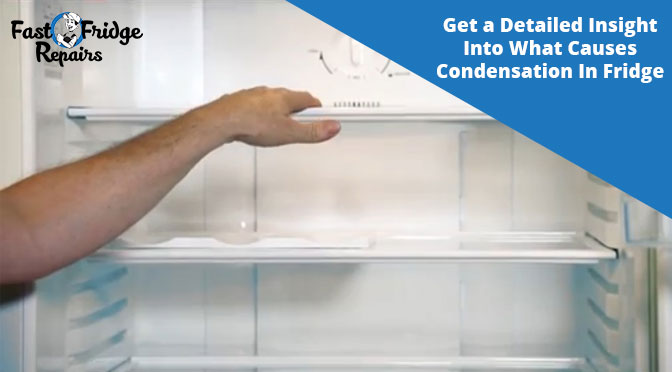
Odors can buildup and cause food to begin to decay rather quickly. With these tips youll be able to get rid of moisture build u.
Not only does it make for a drippy refrigerator but this warmer humid air can also make the compressor work harder than it should.
What causes moisture in a refrigerator. This moisture is caused by the warm air coming into contact with the colder temperatures in the refrigerator. This will disappear after the unit completes the defrost cycle and goes back into normal operation. Open containers of food or beverages will transfer some of their moisture into the air inside the refrigerator.
If the gasket is broken on torn it can leak warm air into the refrigerator which will cause moisture to build up. Most gaskets can be easily replaced by yourself. However if your unit is still under warranty you can call a technician and have the gasket replaced.
This can be caused by the fridge being overfilled preventing air from moving around and keeping the fridge frost-free. If ice builds up this can stop water from draining out of the fridge. The only way to fix it is to de-ice the fridge by turning it off and letting the ice melt.
Sources of Condensation You may notice moisture on the sides of the refrigerator if youre in the habit of transferring warm items directly from the stove but the most common source of. Condensation occurs when warm humid air comes in contact with a cold surface. As the warm air cools it releases its moisture in the form of water droplets.
If you are experiencing condensation in your refrigerator it is a sure sign that all is not well. Read below to discover the top three reasons for. Continue reading Top 3 Reasons for Refrigerator Condensation.
With these tips youll be able to get rid of moisture build u. This video covers troubleshooting techniques in case of moisture build-up in your refrigerator. Moisture corrosion often worsens electrical insulation located on the motor windings of hermetic compressors in the end causing a short circuit between windings and other reasonable compressor components of the dome.
Moisture in the refrigeration system can. Apr 25 2009 0805 PM 18. This is a problem Ive never experienced before but every container I put in my refrigerator becomes loaded with water droplets.
For example if I put a ziploc bag or a tupperware container in the fridge by the next day the food is soaking wet from dewdrops that have formed inside. Technician A says that air in the system can cause excessive pressure within the system restricting the refrigerants ability to change its state from gas to liquid within the refrigeration cycle. Technician B says that moisture can cause freeze-up at the cap tube or expansion valve which restricts refrigerant flow or blocks it completely.
To keep food within the confines of the refrigerator there needs to be some moisture. To keep food within the confines of the refrigerator there needs to be some moisture. When there is too much moisture mold and bacteria can begin to grow rapidly.
Odors can buildup and cause food to begin to decay rather quickly. Humid air entering a refrigerator makes moisture condense on the interior. Not only does it make for a drippy refrigerator but this warmer humid air can also make the compressor work harder than it should.
Here are a few things to do if you notice condensation inside your refrigerator. What Can Cause Too Much Moisture on the Interior of a Refrigerator. Frequency of Opening Door.
Opening the refrigerator door too frequently can cause moisture to build up on the interior. High Humidity in Refrigerators. The external environment also plays a.
Moisture in the refrigeration system problems and remedy Evaporator starving of refrigerant and rapid rise in condenser pressure causes a compressor to short cycle. Icing at the expansion valve filter. In case of a hermetic compressor moisture can cause corrosion and damage to the motor windings.
More often than not considerable amounts of damp and condensation in your fridge is caused by warm air. When it comes to putting a recently cooked meal in the fridge many are guilty of not allowing their food to cool down before storing it in cold conditions. When you open your refrigerator to find the shelves sides and even the top covered with drops of water it can be quite disturbing.
The first thing to check is whether you have recently placed a warm dish or pot in the fridge. The heat from the dish and food will come into contact with the cold air and this will cause some serious fridge issues. Water formation on a fridges back wall is an entirely normal physical process.
Water will condense and collect at the coldest point. Cold air can hold less moisture than warm air. In refrigerators water condenses on the rear interior wall because this is where the evaporator which extracts the warmth from the interior is located.
Condensation or moisture inside food storage containers is normal. Water vapor in the air trapped in the container when it is sealed forms condensation. Water vapor condenses on the coldest surface first.